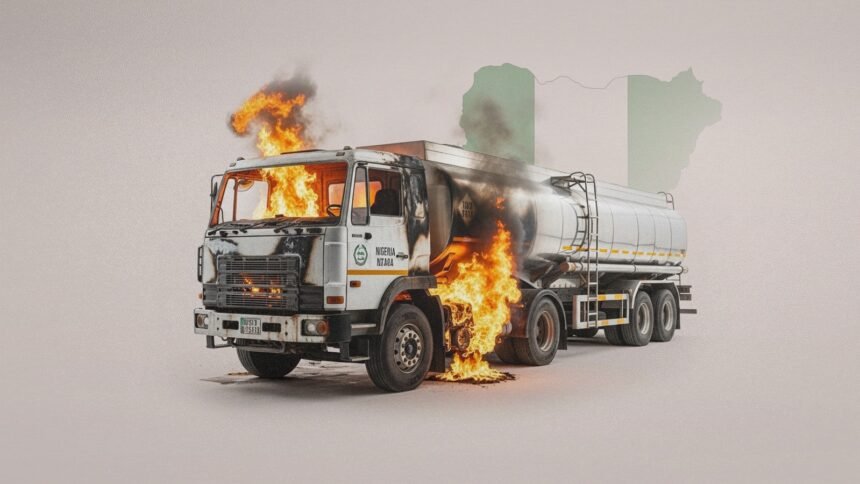Another Nigerian tragedy has unfolded on the highway — one that’s all too familiar and yet no less devastating. A fuel tanker exploded in Rivers State on Thursday morning, killing at least 45 people and injuring dozens more. The inferno tore through vehicles, roadside shops, and homes, leaving behind a charred landscape of twisted metal and grief. Officials say the tanker overturned while trying to avoid a pothole, igniting shortly after bystanders rushed to collect leaking petrol.
This isn’t just another accident; it’s part of a grim pattern that’s become a stain on Nigeria’s road safety record. Every few months, the same story repeats — a tanker crash, a crowd of desperate residents siphoning fuel, and an explosion that leaves nothing but silence. The causes are no mystery: bad roads, reckless driving, poorly maintained vehicles, and a dangerous mix of poverty and neglect.
Witnesses described scenes of chaos as the tanker burst into flames. “People were shouting and running everywhere,” said Emeka Obi, a local trader whose shop was destroyed. “Some tried to help, but the fire moved too fast.” Video footage shared online shows a thick plume of black smoke rising over the town of Ahoada, as firefighters struggled for hours to contain the blaze.
Officials have promised investigations, but Nigerians have heard that before. The Federal Road Safety Corps blamed “human error” and “infrastructure failure,” while local politicians called it an “avoidable tragedy.” The truth is, both are right. Nigeria’s highways are death traps — riddled with craters, littered with broken trucks, and patrolled by drivers who gamble daily with overloaded vehicles and failing brakes.
It’s not just about roads, though. It’s about a system that leaves millions living one spark away from disaster. In villages and towns across the oil-rich Niger Delta, poverty drives people to collect spilled petrol despite knowing the risks. With unemployment high and fuel prices rising, a few liters can mean the difference between eating and going hungry. “They were not thieves,” said one local pastor, defending the victims. “They were survivors.”
The tragedy also exposes the contradictions of Nigeria’s oil wealth. The country pumps millions of barrels of crude a day, yet suffers constant fuel shortages. Refineries rarely function, forcing imports of refined fuel at inflated costs. Tankers then become mobile lifelines — and mobile threats. Each one carries not just fuel but the risk of catastrophe.
Successive governments have promised to fix this. They’ve pledged new refineries, better transport networks, and stricter safety standards. But corruption and bureaucracy have burned through every plan. Even President Bola Tinubu’s ambitious infrastructure agenda struggles against decades of decay. Roads linking Port Harcourt to the north are barely passable in the rainy season. Tankers sway and tip like rolling bombs on the cracked asphalt.
In the aftermath, the government declared three days of mourning. But candles and condolences won’t rebuild lives. Hospitals are overwhelmed, with many victims suffering severe burns. Relief groups are calling for long-term measures: stricter tanker regulation, better emergency response, and real investment in road repair. Yet, as history shows, once the smoke clears, Nigeria tends to move on — until the next explosion.
Social media has erupted with anger and exhaustion. “How many times will this happen before someone fixes our roads?” one user wrote on X (formerly Twitter). Others shared old headlines from similar disasters — in Benue, Ogun, Oyo — a timeline of preventable loss. The anger is justified, but resignation runs deep.
For now, the survivors of Ahoada will bury their dead, rebuild their homes, and wait for the next tanker to pass. And across Nigeria, millions will hold their breath as another rusting fuel truck groans down a broken road. Everyone knows what could happen — but no one in power seems willing to stop it.
If Nigeria’s highways are the veins of its economy, then fuel tankers have become its clots. Until the country unclogs its infrastructure and priorities, tragedies like this will keep flaring up — quick to burn, quicker to forget.










